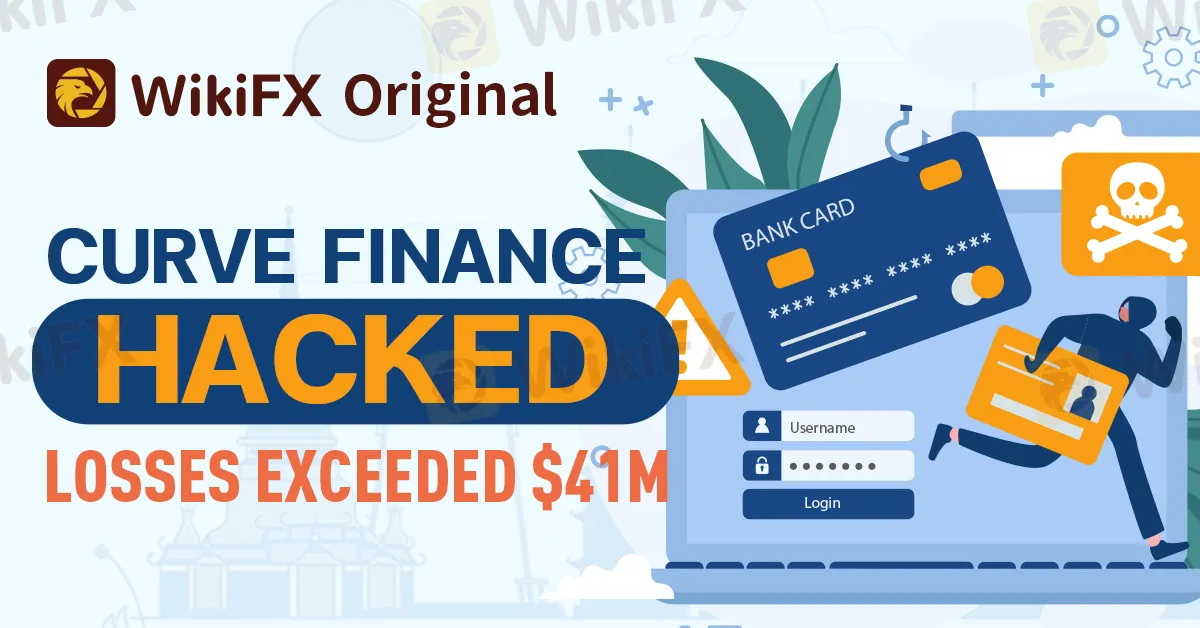简体中文
繁體中文
English
Pусский
日本語
ภาษาไทย
Tiếng Việt
Bahasa Indonesia
Español
हिन्दी
Filippiiniläinen
Français
Deutsch
Português
Türkçe
한국어
العربية
Curve Finance Hacked, Losses Exceeded $41M
Abstract:In the aftermath of an exploit that resulted in a staggering $41 million loss on Curve Finance, concerns arise over the vulnerability of smart contracts built with certain versions of the programming language Vyper, affecting not only Curve but other related protocols and DeFi projects.

Multiple teams that have forked the Curve Finance code are now reporting exploits after a hacker discovered a vulnerability in an old compiler used in the programming language Vyper, resulting in an estimated $41 million being exploited from the Curve Finance decentralized exchange, raising concerns about the vulnerability in the broader DeFi ecosystem, specifically affecting smart contracts built with certain versions of Vyper, which is commonly used in various crypto projects but less prevalent than Solidity, according to Michael Lewellan, OpenZeppelin's head of solutions architecture.

Vyper's team tweeted those contracts developed with versions 0.2.15, 0.2.16, and 0.3.0 of the language are currently “vulnerable to malfunctioning reentrancy locks,” urging developers of other Vyper-based decentralized applications (dApps) to address the issue immediately, as the problem lies within Vyper itself, which has been in existence for a considerable time, explained Gustavo Gonzales, a solutions developer at Open Zeppelin.

The hack's execution and exposure of Curve's smart contract vulnerability have led some, like the pseudonymous Vyper developer “señor doggo,” to suspect the involvement of “state-sponsored hackers” due to the level of resources, time, and expertise employed.
The issue affects Vyper-based smart contracts that meet two conditions: they must be built using version 0.2.15 of Vyper, and appropriate safeguards for adding and removing liquidity must not be implemented in the code, as stated by Officer's Notes, an independent security researcher.
As a consequence of the exploit, other Curve protocol forks on different chains are facing similar exploit reports. Ellipsis Finance, an authorized Curve fork with $6.5 million in total deposits, tweeted about a “small number of stablepools with BNB” being exploited.

The Tricrypto pool on Curve's deployment on the layer-2 solution Arbitrum was also “potentially affected” but had not been exploited at the time of the announcement, according to the Curve Finance team.
In response to the situation, Auxo DAO, a decentralized yield-farming fund with total deposits worth $5.4 million, decided to remove liquidity from Curve and Convex Finance pools as a precautionary measure against contagion risks.
Convex Finance, a DeFi application providing yield optimization strategies for Curve's CRV tokens with total deposits worth $1.382 billion, experienced a significant liquidity drop of 52.5% since the exploit, decreasing from $2.91 billion to $1.382 billion.
Convex Finance holds approximately 298.3 million CRV tokens, representing about one-third of CRV's circulating supply, according to a Dune dashboard.
To earn fees and staking rewards from Curve, users usually need to lock CRV tokens for up to four years. However, Convex bypasses this locking period by issuing a derivative called cvxCRV, allowing liquidity retention and enabling users to lock CRV tokens to earn trading fees and claim boosted CRV without locking their CRV.

Disclaimer:
The views in this article only represent the author's personal views, and do not constitute investment advice on this platform. This platform does not guarantee the accuracy, completeness and timeliness of the information in the article, and will not be liable for any loss caused by the use of or reliance on the information in the article.
Read more

UK Authorities Freeze Nearly $7.7 Million in Illicit Crypto Assets Within a Year
Crypto wallets tied to fraud and tax evasion were frozen under new enforcement powers granted in 2024.

Australian Authorities Joins Forces with Philippine Authorities to Combat Cyber Scams
AFP tackles cyber scam boiler rooms in the Philippines, training police to fight fraud and protect Australians from romance and cryptocurrency scams.

Steam Set to Launch Blockchain Game “Paradise” Amid Scam Allegations
“Paradise,” a blockchain-based game accused of being a crypto scam, is set for release on Steam, sparking concerns over platform’s ban enforcement and consumer risks.

Coinbase Phishing Scams Drain $46M from Users in Two Weeks
Coinbase phishing scams cost users $46M in two weeks. Learn how scammers target the crypto exchange and tips to stay safe.
WikiFX Broker
Latest News
Exposing the Top 5 Scam Brokers of March 2025: A Closer Look by WikiFX
Gold Prices Climb Again – Have Investors Seized the Opportunity?
Webull Launches SMSF Investment Platform with Zero Fees
Australian Regulator Warns of Money Laundering and Fraud Risks in Crypto ATMs
FCA Warns Against 10 Unlicensed or Clone Firms
CySEC Warns Against 14 Unlicensed Investment Websites
Top Currency Pairs to Watch for Profit This Week - March 31, 2025
Will natural disasters have an impact on the forex market?
Philippines Deports 29 Indonesians Linked to Online Scam Syndicate in Manila
AI-Powered Strategies to Improve Profits in Forex Trading
Currency Calculator







